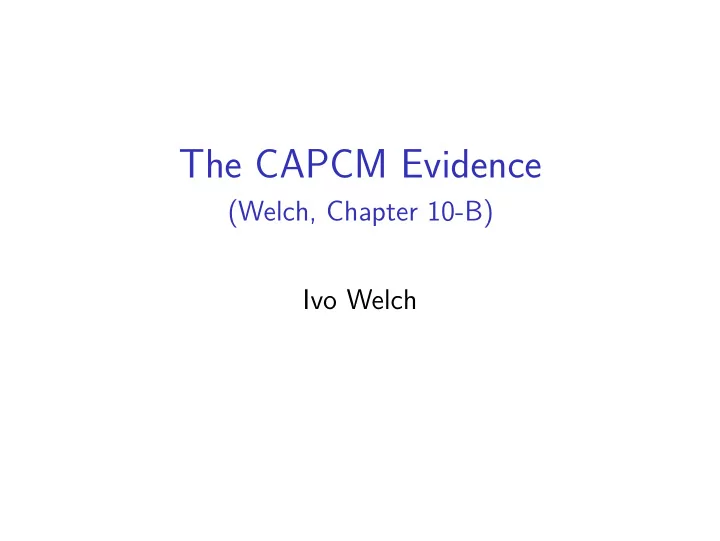

The CAPCM Evidence (Welch, Chapter 10-B) Ivo Welch
Truthiness So What? Is the CAPCM True? No model is strictly true, but it is a good and useful model? Do its assumptions seem reasonable? Did high-beta stocks (say, 1.5) outperform low-beta stocks (say, 0.5) by about 2-4% per annum?
Security-Market Line (SML) The SML has market-beta on its x-axis and expected return on the y-axis. How should the SML look like if you knew the true inputs?
Graph: SML Exact Figure 1: beta
SML with Estimated Inputs How should the CAPCM SML look like if you had to estimate the CAPCM inputs first?
Graph: SML Noisy Figure 2: beta
Most Basic CAPCM Implication Stocks with high market-betas should outperform stocks with low market-betas. ◮ Real World SML: Flat negative!
Graph: Empirical Performance of Beta Quintile Portfolios Figure 3: beta
Specific Alternative Tests Many other factors seem to matter, such as momentum, profitability, etc. have mattered. And, even if it were better, for corporate CoC estimates, how good would the point estimates be anyway??
But Shouldn’t It Have Held? Not necessarily. Do you care about house wealth? Hedge it! Do you care about labor income? Hedge it! Is the market near perfect? Did you know the inputs? Market-correcting forces are not strong ◮ No easy way to take advantage. ◮ Only slightly better bets for CAPCM-like investors.
Why Learn The CAPCM? The CAPCM sometimes gives reasonable cost of capital estimates. ◮ Think stopped clock twice a day. It is a beautiful bedtime story. It gives good intuition. ◮ It makes internal sense (under some strong assumptions, such as tradability of all goods).
Why Study the CAPCM? Better predicting alternatives are all ad-hoc. ◮ I prefer “asset-class based capital budgeting” (benchmarking). ◮ I prefer that debt and equity have modestly different costs of capital, and the cost of capital is strongly horizon-dependent. ◮ Not in wide use, but well backed up by data. ◮ Generically, benchmarking is in good use.
Why Study the CAPCM? Who is using the CAPCM? CFOs, regulators, courts, IRS, etc. In surveys, 73% of all firms say the CAPCM is what they use . Others: ◮ “ad-hoc historical returns”: 39% frequency ◮ various modified CAPCM models: 34% frequency ◮ “Gordon model” & “Whatever our investors are telling us”: 15%
Why Study the CAPCM? The CAPCM is widely but incorrectly considered “best practice.” If you don’t understand it, you will be considered an uneducated noob. ◮ In reality, it may well be the actual users of the CAPCM that are the noobs. . . ◮ but it is often the noobs who are in charge now, ◮ educated in B-schools 20-40 years ago, when profs still believed that the CAPCM worked.
Cynics View: Why Still in Use? The real reasons why the CAPCM is still in use: ◮ Hazing—no longer by professors, but by practitioners? ◮ Fake Media? ◮ Wishful thinking? ◮ Reality Deniers? ◮ Ignorance?
“CAPCM Use” Warning Never expect much accuracy from the CAPCM. If at all, use the CAPCM only for ballpark cost-of-capital estimates. Never use the CAPCM for portfolio decisions. Don’t use it for short-term predictions, and don’t use it for long-term predictions. Don’t use the CAPCM unless forced.
Disagreements Over PV? It is difficult to estimate the equity premium, and common beta input estimates often stink, and you don’t even know the right model or benchmark, either. & So is it cold comfort that E(CF) estimates are usually even worse than E(r) estimates?
Omitted Appendices Alternatives: Multi-Factor Type Models. Not just beta, but potentially exposure to other factors. (Controversy: could be characteristics and market inefficiency.) Arbitrage Pricing Theory (APT). Fama-French-Momentum-Free-for-all. ◮ Factors keep moving around or disappearing. Alas, even these “custom” alternative have been pretty lousy forward-looking, too.
Now What? Alternatives! ◮ Even if the CAPCM holds, benchmarking can still work. ◮ Even if the CAPCM fails, benchmarking can still work. But you need good benchmarks.
Recommend
More recommend